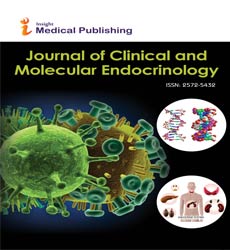Can Renalase Enzyme Play a Role in Resolving the Problem of Erectile Dysfunction?
Suleyman A, Ibrahim S
1Department of Medical and Clinical Biochemistry, School of Medicine, Firat University, Turkey
2Department of Medical Biology, School of Medicine, Erzincan Binali Yildirim University, Turkey
- *Corresponding Author:
- Prof. Dr. Suleyman Aydin
Department of Medical and Clinical Biochemistry
School of Medicine (Firat Hormones Research Group)
Firat University, 23119-Elazig, Turkey
Tel: 905334934643
Fax: 904242379138
E-mail: aydin1@hotmail.com
Received date: July 23, 2018; Accepted date: July 26, 2018; Published date: July 31, 2018
Citation: Suleyman A, Ibrahim S (2018) Can Renalase Enzyme Play a Role in Resolving the Problem of Erectile Dysfunction?. J Clin Mol Endocrinol 3: e113. doi: 10.21767/2572-5432.1000e113
Copyright: © 2018 Aydin S, et al. This is an open-access article distributed under the terms of the Creative Commons Attribution License, which permits unrestricted use, distribution and reproduction in any medium, provided the original author and source are credited.
Editorial
Erectile dysfunction (ED) is the inability to obtain adequate erection for a successful sexual intercourse or the continuity of the state of not sustaining adequate erection [1]. This is a serious health problem which affects more than 150 million men and their wives worldwide [2] and the population-based survey in Turkish men of ≥40 years of age reported the prevalence of ED as 33% [3]. Erectile dysfunction may be due to organic (hormonal, vascular, neural, cavernosal abnormalities or lesions related) and / or psychogenic factors [1]. However, it should be noted that, high norepinephrine levels, whether chronic or not, cause erectile dysfunction [4]. Norepinephrine; is the primary chemical messenger of the sympathetic nervous system (Prepare the person for fight or flight and stressful situations). When the norepinephrine level peaks, it causes orgasm/ ejaculation in men. If chronically high norepinephrine is observed in an individual this can cause anxiety or irritability. Continued high norepinephrine (NE) in the individual may result in adrenal exhaustion, fatigue or adrenal insufficiency. When this condition is not intervened, erectile dysfunction, loss of libido and sexual dysfunction may occur. Also, excessive penile NE level underlies impaired erectile function in adenosine A1 receptor deficient mice [5]. It has been also reported that NE levels in the cavernous and systemic blood increase during sexual arousal in patients with ED might be an indication of a somatic dysregulation in sympathetic transmission or alterations of NE reuptake mechanisms as a cause of impaired erectile function [6].
Hence, it is hypothesized in the editorial that high circulating norepinephrine levels in circulation may be associated with decreased renal levels. Renalase is an enzyme which metabolise dopamine, epinephrine and norepinephrine [7,8]. Renalase is synthesized mainly from the renals, but synthesized in a small amount from other tissues, including the brain [8]. In this case, the renals may cause the renal levels to drop because they cannot perform their physiological functions due to any reason (renal failure or atrophy of renal-expressing cells). In such a case (because of insufficient renalase) norepinephrine cannot be metabolized; persistently elevated norepinephrine may cause erectile dysfunction, loss of libido due to the above-mentioned reasons [4-6]. On the other hand, chronically elevated norepinephrine may cause high blood pressure. It can also cause renal failure.
As long as the high level of norepinephrine continues for a long time, the level of dopamine produced by the brain may decrease. Decreased dopamine production may decrease the production of testosterone. Falling testosterone level may cause insulin resistance, erectile dysfunction and lack of libido and it may also cause more metabolic events [9]. Also, various studies have demonstrated that the adverse effects of testosterone therapy in type 2 diabetes mellitus, stressing the cardiovascular risks [9].
When we put together all the information above, it is obvious that there is a relation between erectile dysfunction, loss of libido, and renalase levels. It is suggested that retention of renalase at physiological levels may help to prevent some metabolic events such as erectile dysfunction, loss of libido and chronic renal failure.
References
- https://www.medicalnewstoday.com/articles/5702.php.
- Kalsi J, Muneer A (2013) Erectile dysfunction-An update of current practice and future strategies. J Clin Urol 6: 210-219.
- ÃÆÃâÃâââ¬Â¡ayan S, Kendirci M, Yaman O, AsÃÆÃâÃâçi R, Orhan I, et al. (2017) Prevalence of erectile dysfunction in men over 40 years of age in Turkey: Results from the Turkish Society of Andrology Male Sexual Health Study Group. Turk J Urol 43: 122-129.
- Trussell JC, Kunselman AR, Legro RS. (2010) Epinephrine is associated with both erectile dysfunction and lower urinary tract symptoms. Fertil Steril 93: 837-842.
- Ning C, Qi L, Wen J, Zhang Y, Zhang W, et al. (2012) Excessive penile norepinephrine level underlies impaired erectile function in adenosine A1 receptor deficient mice. J Sex Med 9: 2552-2561.
- Becker AJ, Uckert S, Stief CG, Scheller F, Knapp WH, et al. (2002) Cavernous and systemic plasma levels of norepinephrine and epinephrine during different penile conditions in healthy men and patients with erectile dysfunction. Urology 59: 281-286.
- Xu J, Li G, Wang P, Velazquez H, Yao X, et al. (2005) Renalase is a novel, soluble monoamine oxidase that regulates cardiac function and blood pressure. J Clin Invest 115: 1275-1280.
- Oruc Y, Yardim M, Aydin S (2018) May Renalase Deficiency Catalyzing Catecholamines be one of the Reasons for Glaucoma? J Clin Mol Endocrinol 3:1.
- Beatrice AM, Dutta D, Kumar M, Kumbenahalli SS, Sinha A, et al. (2014) Testosterone levels and type 2 diabetes in men: current knowledge and clinical implications. Diabetes Metab Syndr Obes 7: 481-486.
Open Access Journals
- Aquaculture & Veterinary Science
- Chemistry & Chemical Sciences
- Clinical Sciences
- Engineering
- General Science
- Genetics & Molecular Biology
- Health Care & Nursing
- Immunology & Microbiology
- Materials Science
- Mathematics & Physics
- Medical Sciences
- Neurology & Psychiatry
- Oncology & Cancer Science
- Pharmaceutical Sciences
